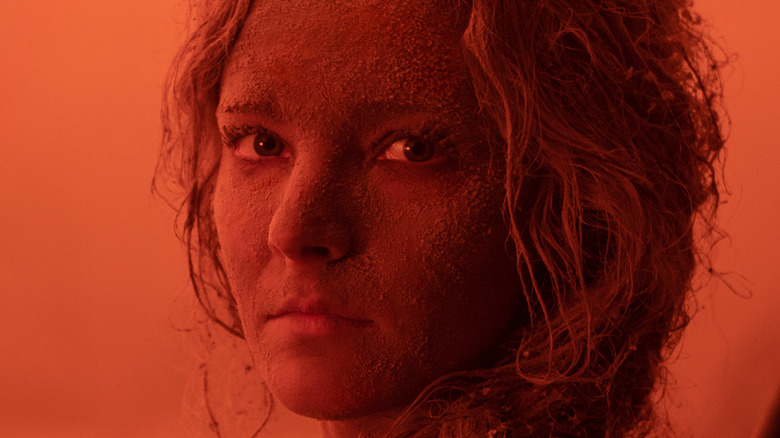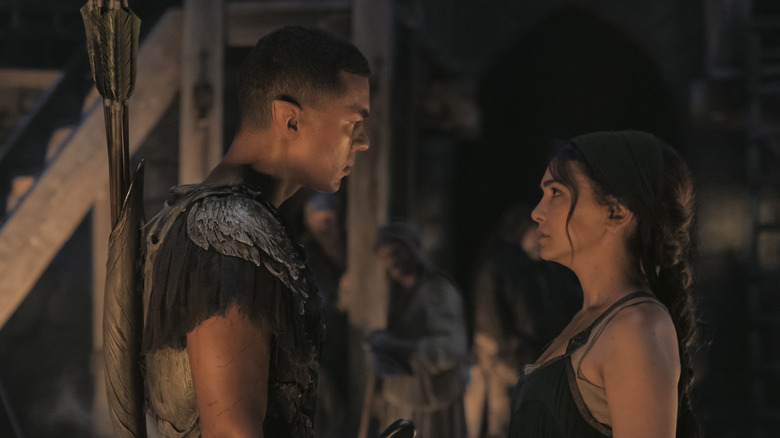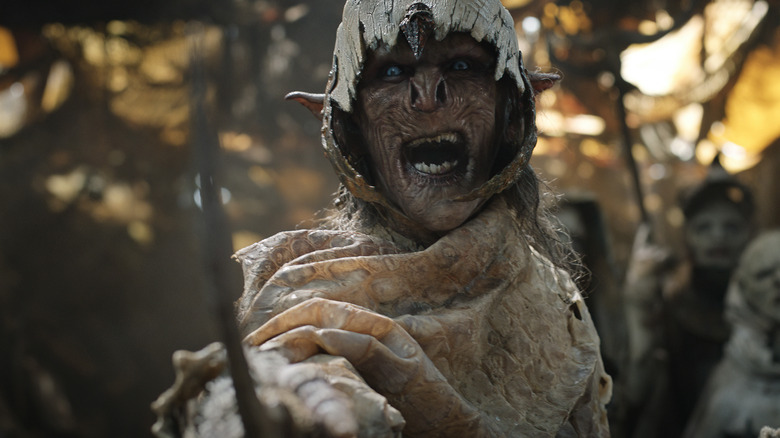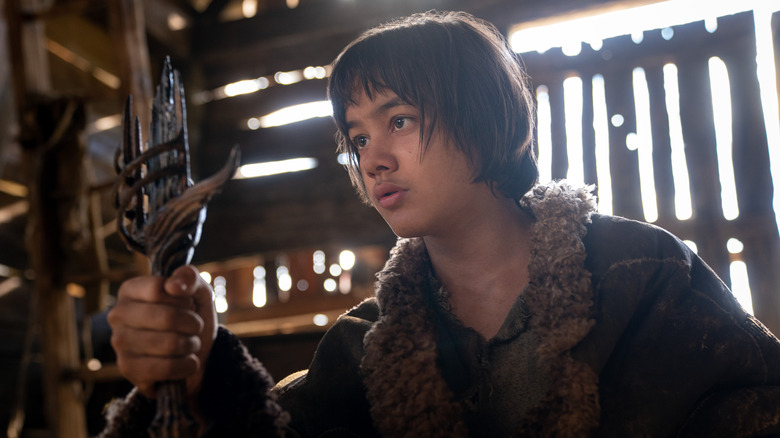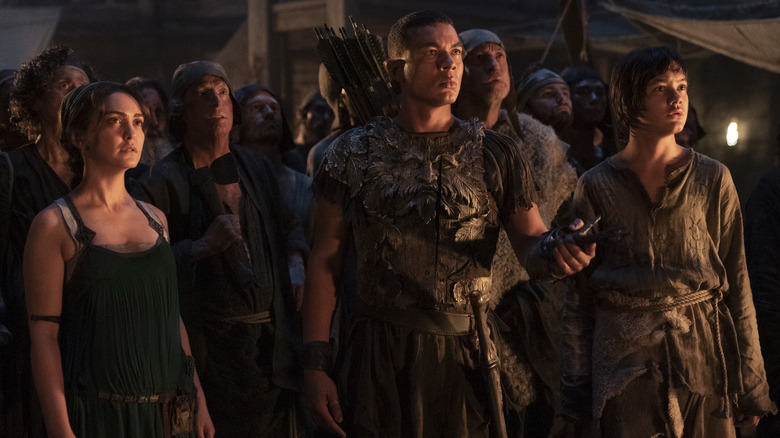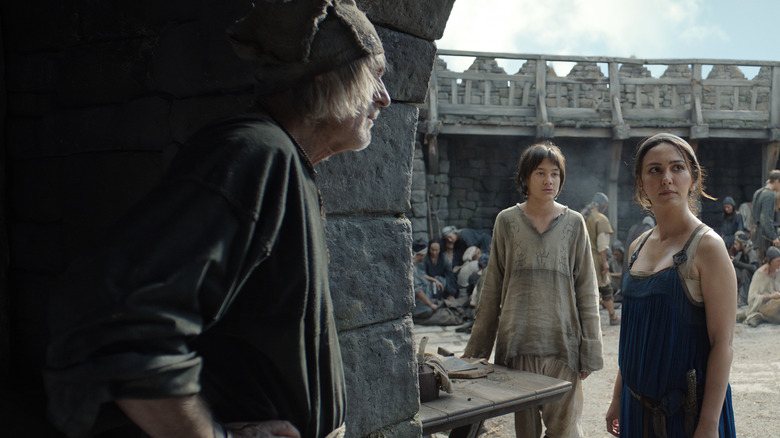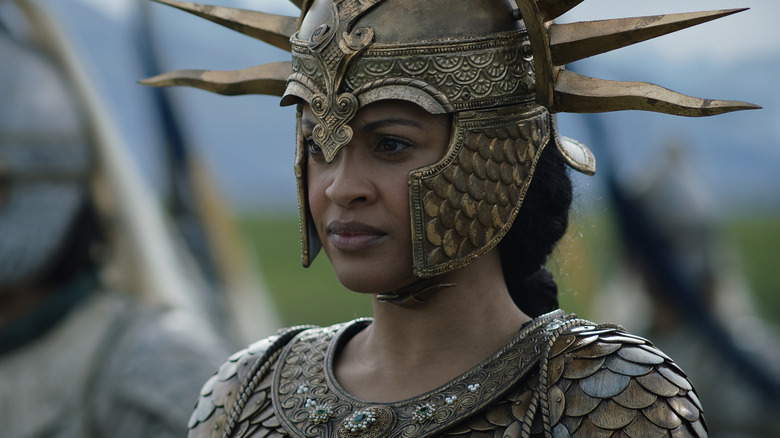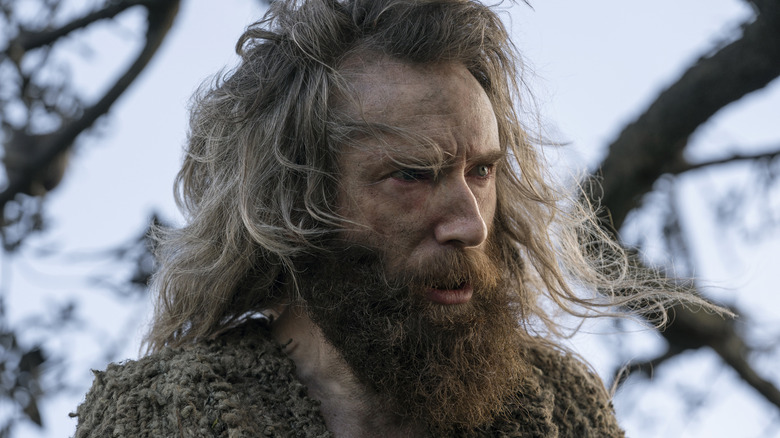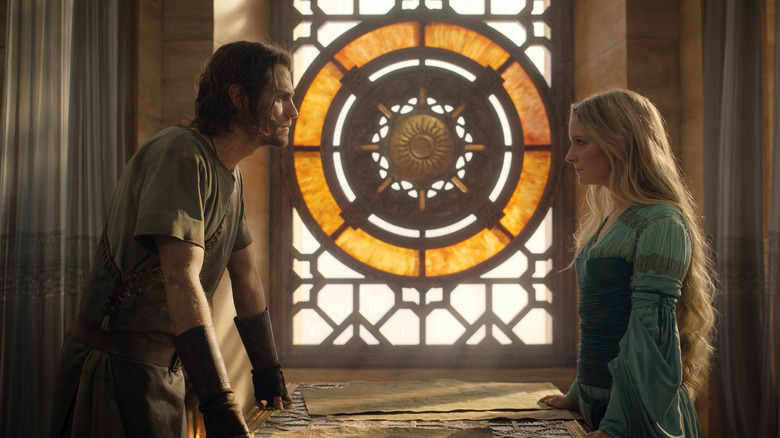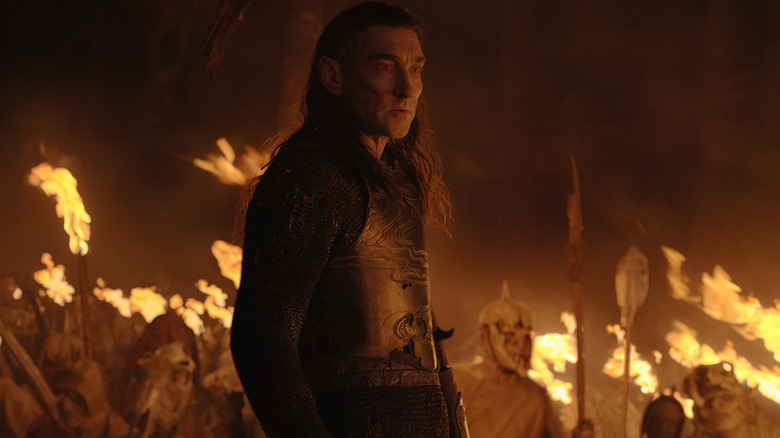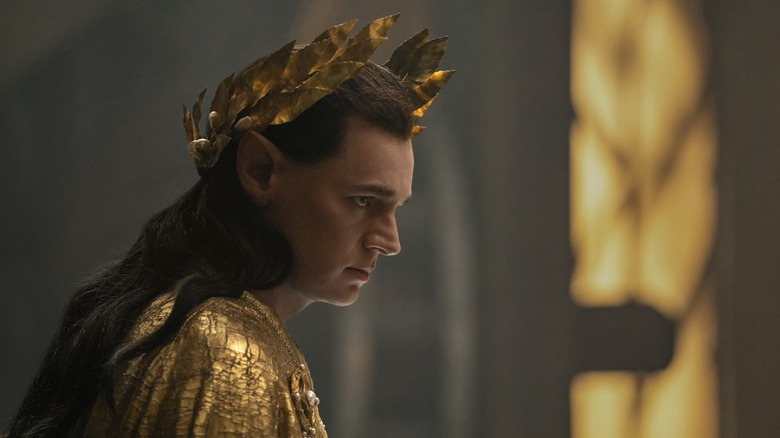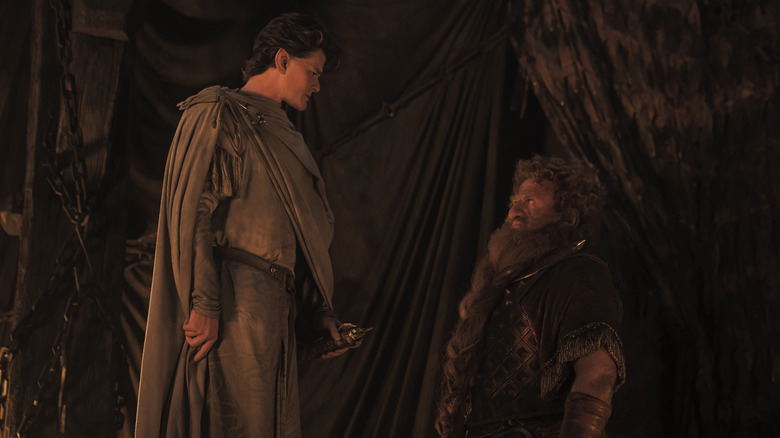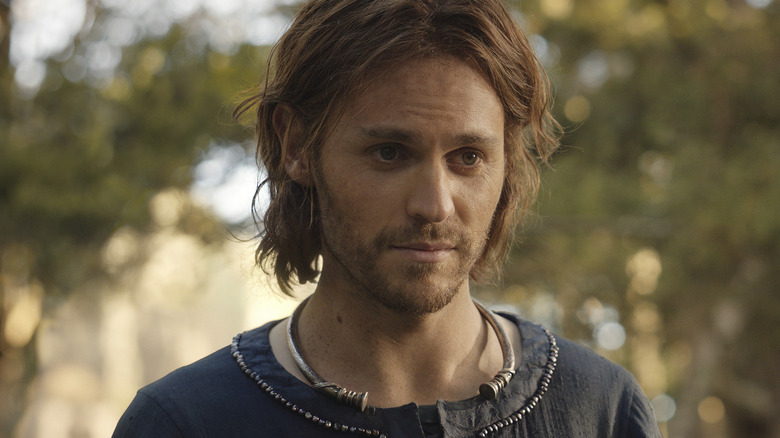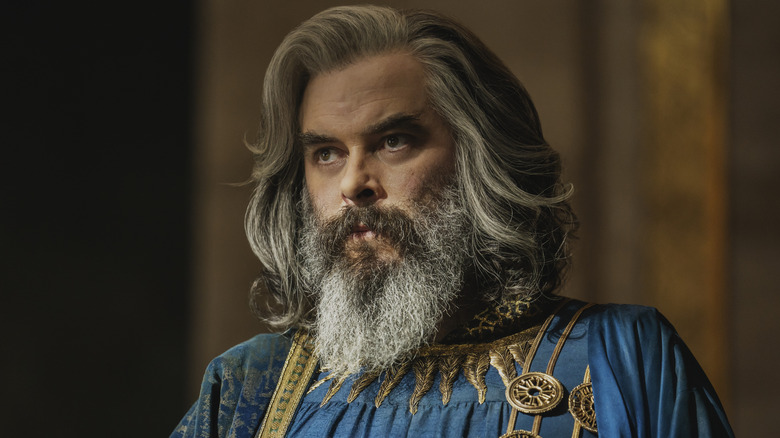The Lord Of The Rings: The Rings Of Power's Most Confusing Moments Explained
The first season of "The Lords of the Rings: The Rings of Power" takes J. R. R. Tolkien fans back to Middle-earth with a few stops in Lindon, Númenor, and Khazad-dûm along the way. In eight episodes, the prequel series delves into the history of several familiar characters like Galadriel, Elrond, Gil-galad, and even Sauron. It also showcases the lives of several new characters like Arondir and Nori who were created for the series. Like "The Lord of the Rings" and "The Hobbit" trilogies, "The Rings of Power" begins with a singular quest, and that's the task of finding Sauron, which Galadriel assigns to herself.
The first couple of episodes arguably start out slow with a focus on storytelling and worldbuilding, but the pace soon picks up. Before long, the Southlanders are faced with an all-out war, and Galadriel and Númenor's Queen Regent Míriel have rallied three ships' worth of troops for the fight in Middle-earth. These separate storylines join together in Episode 6, and central characters like Arondir and Galadriel, and Bronwyn and Halbrand meet for the first time. A lot happens in the following two episodes, and secrets are revealed, but these revelations bring with them more than a few confusing scenes as well as a couple of blink-and-you'll-miss-it moments. Thankfully, we've got you covered with this article, so you don't have to stress about hitting pause and rewinding to find out what's going on — but be warned, there are major spoilers ahead.
When did Arondir and Bronwyn's relationship start?
The first scene between Arondir (Ismael Cruz Cordova) and Bronwyn (Nazanin Boniadi) in Episode 1 is bound to elicit some confusion from fans over the nature and status of the characters' relationship. The brief conversation between the pair where they flirt over elven alfirin seeds doesn't reveal much about their history, only their obvious connection. At this point, it's not clear if their forbidden romantic relationship is just blossoming or if it has been going on for a while and they're just acting very restrained.
As the episode progresses, viewers are teased with a few more details that make it clear that some kind of romantic relationship between the Silvan Elf and the Southlander began long before the first episode of "The Rings of Power" takes place. First, Arondir visits Bronwyn at her home before he and his company's planned departure from Tirharad and basically tells her he loves her without actually saying the words. Though he intends to depart after, it's not long before their paths cross again and he tells her, "You're the only kind touch I've known all my days in this land," implying they've had an intimate relationship. The nature of their relationship also suggests that Arondir might be Theo's (Tyroe Muhafidin) father, a theory that is bolstered by the fact that Theo's long hair keeps his ears covered for the entire series. If this is the case, it would date their affair to at least the past 15 years.
Why do the Orcs call Adar Lord-Father?
Adar (Joseph Mawle) is a confusing character in "The Rings of Power" and at first glance it's very unclear why this Dark Elf is commanding armies of Orcs and even enslaving other Elves like Arondir and Médhor (Augustus Prew). Adar doesn't grace the screen until the end of Episode 3, but his name is floated around before that. It is an elvish word meaning "father," and since the orcs worship him and call him Lord-Father, this wrongly leads Arondir to believe that Adar is Sauron.
Of course, this is just one of many red herrings the series throws at its viewers, but it's one they have to sit with until Episode 5 when Adar confirms to Waldreg (Geoff Morrell) that he is definitely not Sauron. But since literally every character believes that Sauron, Morgoth's successor, is in charge of the Orcs, this makes it all the more confusing as to why they call Adar Lord-Father.
Viewers finally get clarity in Episode 6. While Galadriel (Morfydd Clark) is questioning Adar in the barn, she puts the pieces of his origin together — he was kidnapped by Morgoth as a young Elf, then tortured until his mind became twisted. He turned into one of the first Orcs, and eventually the father of Orcs. At the same time, Adar explains that he rejected Sauron because of his treatment of the Orcs, who he considers his children, hence the title.
How did Theo get the sword hilt?
The sword hilt is a pretty big deal in "The Rings of Power." It literally opens the floodgates to turn the Southlands into Mordor, but how did Theo get it? Well, after it was forged by Morgoth, it fell into the hands of Waldreg's ancestors. After several generations, it became the barman's most prized possession. Waldreg hid in his barn, and it remains there until Theo discovers it in Episode 1. However, the blink- you'll-miss-it-moment at the end of the episode is overshadowed by Galadriel's dramatic jump off the ship, and Bronwyn and Arondir's discovery that Hordern has been burned to the ground.
The sword hilt only really comes into play again in Episode 2 after Theo and Bronwyn are attacked by an Orc who tunnels into their home. In a brief scene afterward, Theo is alone in the barn and picks up the sword hilt — which clearly bears Sauron's sigil — from its new hiding place. Theo still doesn't really know what the hilt is or does, but blood from his wound activates it. It's clearly an evil object, and any viewers who forgot about the brief scene where Theo discovers it in the barn in Episode 1 would be mistaken for thinking he'd picked it up after his fight with the Orc. Of course, this is cleared up in Episode 4 when Waldreg confronts Theo for taking it from him. As the series unfolds, it also becomes evident that the hilt is the object that Adar and the Orcs have been trying to find for decades. It has the same magnetic quality we associate with the Rings of Power themselves. Perhaps that's why Theo was drawn to it.
How did Arondir and Theo use the alfirin seeds to heal Bronwyn?
When they first appear in Episode 1, the alfirin seeds seem like nothing more than a token of Bronwyn's affection for Arondir, since she obtained them in a trade with a healer passing through town. At the time they remind him of home, however, in Episode 6 he gives them back to her and explains their actual significance. It is elven tradition for every warrior to plant a seed before battle so that life will always continue. "New life, in defiance of death," Bronwyn responds. Arondir gives the leftover seeds back to Bronwyn, saying that they will save them to plant together in her garden after they've won, confirming that he plans to have a life with Bronwyn and Theo when this is all over. However, the seeds end up having a different use.
After Bronwyn is struck through by an arrow in the Orcs' second attack, she's on the brink of death. Arondir and Theo almost give up hope of saving her until she pulls out the little jar of seeds and says "burn," giving them the idea to use the seeds to cover her wounds and seal it with fire. She knows that since the Valar protects all life in existence, they're her only hope at defying death.
Subtle dialogue explains how Waldreg got the sword hilt for the second time
At the end of Episode 6 when it looks like the Southlanders and Númenoreans have won the battle, things take a turn for the worse. Waldreg succeeds in using the sword hilt to enact Adar's plan of transforming the Southlands in Mordor. First it sends water rushing through the tunnels the Orcs have been digging and directs into Mount Doom. This triggers a volcanic eruption which changes this Middle-earth landscape forever. However, one part of this sequence was particularly confusing — how and when did Waldreg get the hilt? Just moments before, viewers watched as Theo accepts it from Arondir, who gets it back from Galadriel after she catches Adar. However, it turns out to be a decoy. Apparently, neither of them thought to check that they had retrieved the correct object. So, instead, when Theo unwraps the hilt, he finds a small ax instead.
The next scene cuts to Waldreg with the hilt, and it turns out he's actually had it for a while. Viewers may recall that earlier in the episode, Theo gave up the hilt to Adar to save his friends and neighbors. Immediately after this, Adar takes it outside, turns to Waldreg and says, "Waldreg, I have a task for you." The brief line is easy to miss and Galadriel's arrival with the Númenorean soldiers is inevitably distracting.
How did Queen Regent Míriel lose her sight?
Along with Galadriel, Queen Regent Míriel (Cynthia Addaí-Robinson) leads the Númenorean army into battle. Just as it looks like the battle is won, Waldreg triggers Mount Doom's volcanic eruption, which plunges The Southlands into chaos. Episode 7 opens with a mix of gray smoke and red flames, which is all that can be seen around the land. Míriel is one of the first characters confirmed to be alive after the eruption, as she helps Isildur (Maxim Baldry) free Valandil (Alex Tarrant). She calls out to the soldier and helps him, which clearly means she has her sight. When she's on her horse riding away from the village, Captain Elendil (Lloyd Owen) realizes she can't see anything. She asks him when they'll be clear of the smoke, but when he confirms that they already are, she says, "I see," to which he asks, "Do you?" and she admits all she can see is gray. So how and when did Míriel lose her sight?
It happens in another blink-and-you'll miss-it scene when Isildur is helping the queen clear a path through the broken structure. As it's coming down, she's struck by ashes that damage her eyes, and Isildur is presumed dead (though "LOTR" fans know it's not the end for his character just yet).
Who is The Stranger if he isn't Sauron?
No, the Stranger isn't Sauron, but it's okay if you believed he was, even just for a minute. That plotline was one of many wrong turns viewers are supposed to take on the way to discovering Sauron's true identity.
As everyone, including the Stranger, is clamoring to know his identity, Episode 8 finally confirms that he's actually a powerful good wizard. After the Mystics try to convince the Stranger that he's Sauron, Nori tells him that it's up to him to show them who he wants to be. "I'm good," he bellows as he fights against them and prepares to send them back to the shadows from whence they came. Moments before, they confirm he is definitely not Sauron and drop a clue to his real identity. "He is the other. He is the Istar," The Ascetic (Kali Kopae) whispers.
While they don't offer a name, knowing he's one of the Istar is a good place to start, and it gives us a few names to guess at. Of course, the obvious identity of the Stranger is Gandalf, not least because he utters a very Gandalf-like phrase to Nori at the end of Episode 8. When she ponders about which direction to go, he says, "There's a sweet smell in the air this way. When in doubt, Elanor Brandyfoot, always follow your nose." However, Gandalf doesn't arrive in Middle-earth until the Third Age, so his arrival now would be hundreds if not thousands of years too early. It's more than likely that the Stranger is actually another Istar whose backstory and origin are yet to be explored.
How did Galadriel figure out Halbrand was really Sauron?
It's been repeatedly said that Sauron has had many names, and apparently Halbrand (Charlie Vickers) is one of them. The biggest twist of "The Rings of Power" comes just moments after the Mystics confirm that The Stranger is not Sauron. Instead, it turns out Galadriel's greatest enemy has been hiding under her nose all this time. Although the name Halbrand is not one J. R. R. Tolkien ever used, the character's last storyline aligns with the lore the author created using the identity Annatar, Sauron's alter ego who leads and guides the elven smiths as they create the Rings using the "gift" of his knowledge and experience.
Having been taken to Lindon to be healed by Lord Celebrimbor (Charles Edwards) by Galadriel, Halbrand is presented with the opportunity to secretly assert his control over the Elves. He presents himself as a humble, helpful smith, but Galadriel starts to sense that something isn't right with her companion, even despite the romantic spark between them. She begins to figure out his deception by digging into Southlander history, but it's a couple of phrases Celebrimbor uses — "the unseen world" and "not of the flesh, but over flesh" — that really tip her off. Adar uses both of those terms in connection to Sauron in Episode 6. Don't worry if Halbrand had you fooled, though. Even Charlie Vickers didn't know he'd be playing the evil Maiar until Episode 3.
How could Adar have killed Sauron?
The revelation that Halbrand is actually Galadriel's foe Sauron begs the question: Did Adar actually kill Sauron? And if so, how did he do it? Back in Episode 6, the Dark Elf tells the commander of the Northern armies that he's already defeated her enemy. "I split him open. I killed Sauron," Adar proudly says, but Galadriel doesn't believe him for a second.
However, Adar sounds convinced of his victory, so could it be true? Well, the key here is in the wording. The Dark Elf says he "split" Sauron open, which is something that could happen to an immortal Maiar. Since he can't die, Sauron is an ever-present spirit even after his body dies. He can survive in spirit form and take on new hosts. That's why Adar doesn't recognize Halbrand when he fights him earlier in the episode, because he's never encountered him in that form. With hindsight, the scene alludes to Halbrand's true identity, too, since we already know Adar did something to him in the past. Whether Adar knows that Sauron would return remains to be seen, though, as he seems convinced Sauron's out of the picture once and for all.
Why are the Elves dying when they're meant to be immortal?
In the fifth episode of "The Rings of Power," High King Gil-galad (Benjamin Walker) makes a shocking admission to Elrond (Robert Aramayo) about the real reason he sent him to work with Celebrimbor and reunite with his dwarf friend Prince Durin (Owain Arthur). The king tells the half-elven lord that Lindon's great tree is starting to decay, which he first notices when Galadriel returns in Episode 1. He admits that he hoped he could stop the decay by sending her away, but it has only spread. As the tree dies, the light of the Eldar fades, which left unresolved will cause all Elves to fade away. But aren't Elves meant to be immortal beings? What exactly does this mean?
Yes, compared to Men and other moral beings, the Elves, who never age and never get sick, are immortal, but it is possible for their light to fade away. According to Elrond's explanation of elven lore in Episode 5, the tree was forged from great conflict between light and dark forces, and it forced a great power into the depths of the mountains, which Gil-galad believes is the Mithril — the ore that contains the light of the last Silmaril. However, he believes that with an infusion of Mithril, the Elves can be saved. This storyline is a slight departure from Tolkien's lore but is ultimately important for the crafting of the first Rings of Power.
Why wouldn't King Durin allow his son to save the Elves?
After Elrond all but admits its existence, High King Gil-galad concludes that the only thing that can save the Elves is the Dwarves' newly discovered super-ore, Mithril. So, as Elrond humbly admits, the fate of all Elves is literally in Prince Durin's hands. Given his strong brotherly bond with Elrond, it's not surprising that the Dwarf prince agrees to help them, but he is blocked by his father, the king who is also named Durin.
Prince Durin defies his father's command not to mine the Mithril time and time again, but this time the king physically blocks their way, claiming it is because the mines are unstable. However, in a private moment with his son, King Durin reveals that is not the only reason he doesn't want to help the Elves. Their conversation turns heated as the king orders his son to do nothing because the fate of the Elves has already been decided and it is not the Dwarves' place to intervene. However, when the Dwarf prince disagrees, the king essentially strips his son of his royal status. This leaves Durin powerless to help Elrond further, but it turns out the one piece of Mithril he's already given him is enough to save the day. Perhaps this was fated after all.
Did Sauron only ever plan to create two rings for the Elves?
After offering the "gift" of his knowledge to Celebrimbor, Halbrand and the Lord of Eregion plan to create a crown out of Mithril for the High King Gil-galad, which would save the Elves. However, off-screen this evolves into the creation of a ring. Teasing this, Halbrand comes down to the river to tell Galadriel that the problem with the Mithril is that it's too much power for one object and they need to make two smaller items instead. However, moments later, Galadriel figures out his identity and he retreats back to Mordor before the rings are forged.
When Galadriel returns to Celebrimbor's workshop, she sees Elrond and the elven lord forging ahead with the plan to create two rings. It's Galadriel who suggests that a third ring is needed, because two more easily lend themselves to corruption. Celebrimbor agrees that a third will bring balance — so did Sauron only plan to create two rings for the Elves?
The whole foundation of "The Lord of the Rings" trilogy is that Sauron creates 20 rings. Though we've only seen the three Elven rings so far, it seems that he only ever planned to create two, and the third one was the Elves' idea. Whether this will be the case for other rings — which, in case you need a reminder, are seven for the dwarves, nine for men, and one for Sauron himself — viewers will have to wait and see. Thankfully, "The Rings of Power" Season 2 is already underway.
What happened when Queen Regent Míriel returned to Númenor?
The Númenoreans sustain many casualties during the fight against Adar in the Southlands, but what may be their most unexpected loss comes when they return back to the shores of their homeland. The scene is fleeting, though, and it's hard to discern what exactly happened when Queen Regent Míriel returns home to Númenor.
Silence surrounds them as they arrive back at Númenor and viewers' attention is pulled to Queen Regent Míriel who is impatiently asking Captain Elendil what has happened. "What is it? What do you see?" she asks again. Briefly visible afterward is a port full of black sails, indicating that Númenor is in mourning. Then a quick flash shows the king dead in his bed, with the Queen's adviser Pharazôn (Trystan Gravelle) looking suspect standing over the body.
Though this scene in the finale doesn't give much away, Gravelle's character is one of the first villains to be named in "The Rings of Power," meaning this is just the beginning of his reign of evil. According to J. R. R. Tolkien's writing, Pharazôn is the last king of Númenor, so viewers can expect his hostile takeover to begin in Season 2.
